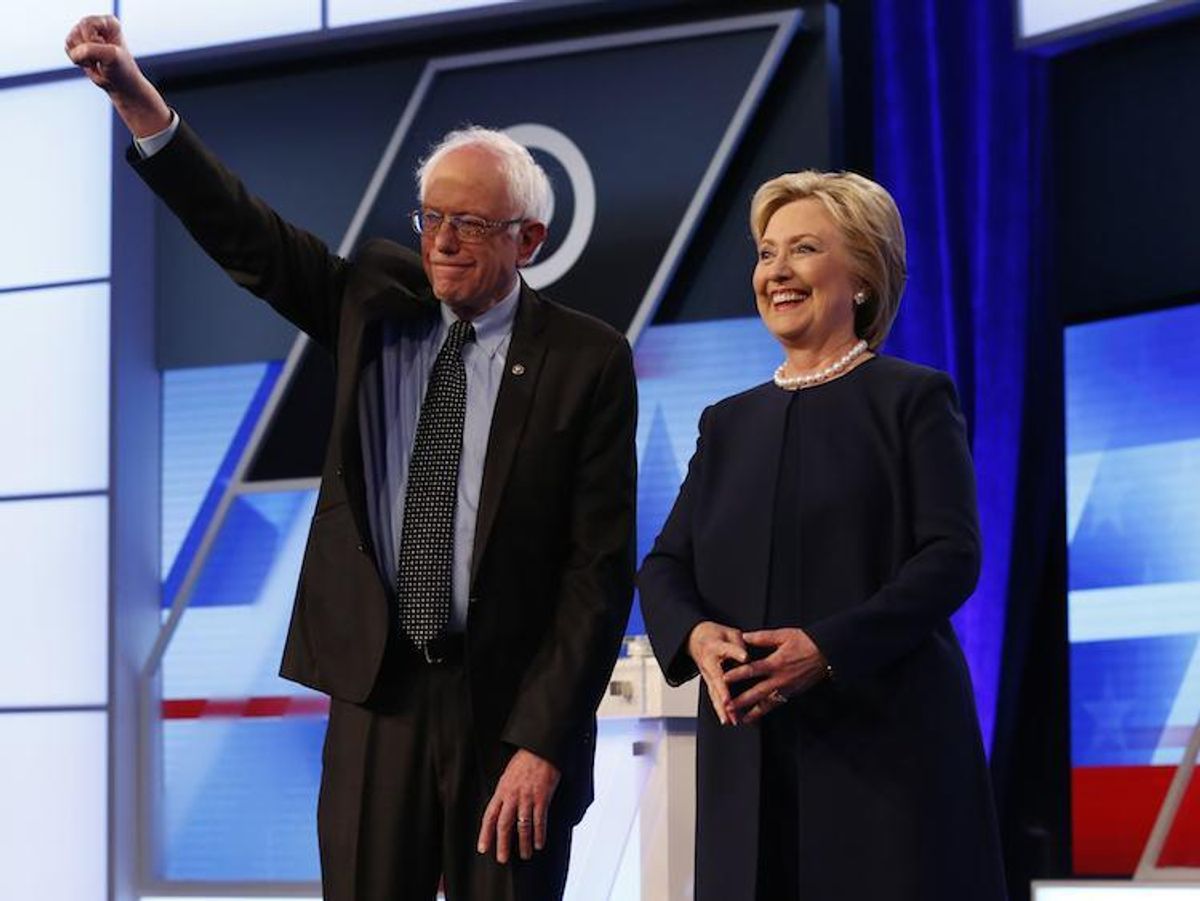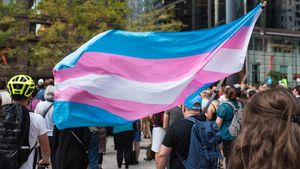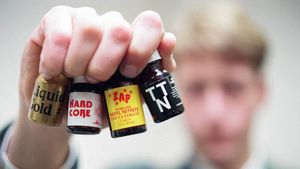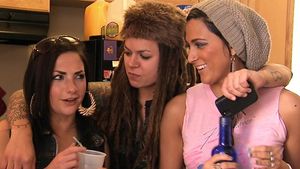Things got a bit testy between Hillary Clinton and Bernie Sanders in Wednesday night's Democratic presidential debate, and both faced some pointed questions from moderators and audience members.
Many of the questions focused on immigration reform in the debate sponsored by Univision and The Washington Post at Florida's Miami-Dade College, six days before Florida, Illinois, Missouri, North Carolina, and Ohio hold their primaries.
Both the U.S. senator from Vermont and the former secretary of State support comprehensive immigration reform with a path to citizenship for undocumented immigrants, but both got quizzed on whether they'd flip-flopped on the issue.
Univision's Maria Elena Salinas, one of three moderators, noted that Clinton said in 2003 that she was "adamantly against illegal immigrants and that people have to stop employing illegal immigrants." Salinas continued, "Your new immigration plan is that you would expand President Obama's executive actions and that you would push for legislation that would include a path to citizenship for undocumented immigrants. So are you flip-flopping on this issue? Or are you pandering to Latinos, what some would call Hispandering?"
After the audience's laughter died down, Clinton responded that in 2003, as a U.S. senator from New York, she sponsored the DREAM Act, a long-stalled piece of federal legislation that would allow undocumented immigrants brought to the U.S. as minors to earn citizenship, and continued to sponsor versions of the legislation in every subsequent congressional session during her time in the Senate. "I have been consistent and committed to comprehensive immigration reform with a path to citizenship," she said.
As she had in previous debates, she brought up an immigration reform bill that she voted for in 2007 and Sanders voted against. "Imagine where we would be today is we had achieved comprehensive immigration reform nine years ago," she said. "Imagine how much more secure families would be in our country, no longer fearing the deportation of a loved one, no longer fearing that they would be found out."
Sanders said he voted against the bill because it would have established a guest worker program that he found so unfair to workers that it was akin to slavery. Salinas showed a clip of Sanders talking to Lou Dobbs on CNN that year, saying the guest worker program would depress wages. "So, Senator, were you concerned with working conditions for guest workers, or really because you think immigrants drive down wages and take jobs from Americans?" she asked.
Sanders replied that workers would be abused and cheated under the guest worker program, as they have been under similar ones, and that such programs create "a race to the bottom for all of our people." He added that he supported a 2013 immigration reform bill -- which, like the 2007 one, failed to pass -- "and what I believe right now is not only that we need comprehensive immigration reform, if the Congress does not do its job, as president of the United States I will use the executive powers of that office to do what has to be done, to do what President Obama did, and expand on that." Obama's Deferred Action for Childhood Arrivals program, created by executive order, implements some provisions of the DREAM Act.
Besides the candidates' back-and-forth over the 2007 bill, some conflict over immigration came when Clinton accused Sanders of siding with the vigilante group known as the Minutemen, which was attempting to stop undocumented immigrants from Mexico from coming into the U.S. "No, I do not support vigilantes, and that is a horrific statement, an unfair statement to make," Sanders said. (The reference was to Sanders's vote for a bill that would have prevented the U.S. government from giving Mexican authorities information about the Minutemen and therefore interfering with the group's activities at the border. "Sanders's staff has said previously that the senator believed the amendment was, in effect, harmless: It would ban something that didn't happen anyway," The Washington Post reports.)
An emotional moment, though, came when an immigrant from Guatemala in the audience asked what the candidates would do to reunite families like hers; her husband was deported three years ago, and she and their five children had not seen him since.
"The essence of what we are trying to do is to unite families, not to divide families," Sanders said. Clinton praised the woman's "incredible act of courage" in sharing her story and said, "I will do everything I can to prevent other families from facing what you are facing. And I will do everything I can to pass laws that would bring families back together."
Sanders challenged Clinton, though, on statements she made about the flood of unaccompanied minors into the U.S. from Central American countries in 2014. "And I said welcome those children into this country; Secretary Clinton said send them back," he said.
Clinton responded that this was a "misrepresentation" of her position. "I did say we needed to be very concerned about little children coming to this country -- on their own, very often -- many of them not making it," she said. "And when they got here, they needed, as I have argued for, legal counsel, due process, to make a decision."
Moderator Jorge Ramos pressed Clinton for a pledge to stop deportations of children if she becomes president, which she eventually gave, saying, "I want to, as I said, prioritize who would be deported: violent criminals, people planning terrorist attacks, anybody who threatens us." Sanders also said he would not deport children.
Salinas brought up the fact that while in the Senate, Clinton voted to fund the construction of fencing at some points on the U.S.-Mexico border, and asked how that differed from Republican front-runner Donald Trump's plan for a wall along the border. Clinton responded that both she and Sanders voted to fund fencing, additional border security agents, and other measures, "and the result is that we have the most secure border we've ever had." That undercuts the Republican argument about the need to secure the border and shows it's time for immigration reform, she said.
Sanders added, "The secretary and I mostly, I think, agree on this issue. Look, in this country, immigration reform is a very hot debate. It's divided the country. But I would hope very much, that as we have that debate, we do not, as Donald Trump and others have done, resort to racism and xenophobia and bigotry. This idea of suddenly, one day or maybe a night, rounding up 11 million people [the estimated number of undocumented immigrants] and taking them outside of this country is a vulgar, absurd idea that I would hope very few people in America support."
Clinton likewise denounced Trump. When moderator Karen Tumulty asked her if she thinks he is a racist, Clinton said people can draw their own conclusions, but she decried "his demagoguery, his trafficking in prejudice and paranoia." She got applause when she used a Spanish term, "basta" (correctly "bastante," meaning "enough") to refer to her reaction to him, and when she said, "You don't make America great by getting rid of everything that made America great."
On other issues, Ramos quizzed Clinton on her use of a private email server as secretary of State. She noted that she did not use it to send any messages marked a "classified at the time, although some have received this designation retroactively. Ramos even went so far as to ask if she'd drop out of the race if she were indicted over the matter. "That's not going to happen," she said. "I'm not even answering that question."
Ramos also asked about allegations that she had lied to the families of the Americans killed at the U.S. mission in Benghazi, Libya, in 2011, about the cause of the attack. "We were scrambling to get information that was changing, literally by the hour," Clinton replied. "And when we had information, we made it public. But then sometimes we had to go back and say we have new information that contradicts it." She noted her 11-hour testimony on the matter before a congressional committee, "and when it was over the Republicans had to admit they didn't learn anything. Why? Because there had already been one independent investigation. There had been seven or eight congressional investigations, mostly led by Republicans, who all reached the same conclusions, that there were lessons to be learned."
The candidates covered many of the same topics they had in previous debates. Sanders again made his case for free tuition at public colleges and universities, up against some criticism from the moderators that this would benefit the wealthy as well as the poor and the middle class, while Clinton called for measured to ease the burden of student loan debt.
He called for universal, single-payer health insurance; Clinton said universal coverage is achievable by building on President Obama's Affordable Care Act. He criticized her acceptance of campaign contributions from major corporations and unwillingness to release transcripts of speeches she had given to them. Clinton said that taking the contributions hasn't kept her from supporting tough regulation.
In a new development, she noted that the Koch brothers, famed for funding conservative causes, have recently put out a video praising Sanders for his opposition to the Export-Import Bank, a federal program that assists U.S. companies with trade. Sanders responded that the bank amounts to "corporate welfare" assisting mostly large companies. He added that he has stood up against the Kochs' efforts "to destroy Social Security, Medicare, Medicaid, and virtually every federal program passed since the 1930s."
Both candidates called for strong action to address climate change, with Sanders saying, "When you have Republican candidates for president and in Congress telling you that climate change is a hoax, which is Donald Trump and other candidates' position, what they are really saying is, we don't have the guts to take on the fossil fuel industry."
Both, naturally, expressed confidence in their campaigns -- Sanders that he can overcome Clinton's lead in delegates, and Clinton that she can bounce back from her unexpected loss to Sanders in the Michigan primary Tuesday. When Salinas asked Clinton, "What went wrong in Michigan?" the candidate responded that it was a close race and that she did win another primary Tuesday, in Mississippi. "I've won some. I've lost some," Clinton said. "But, you know, I was very pleased by the overall outcome last night. And now we're on to the states for next Tuesday, and I'm looking forward to campaigning hard in all of them."
For more on the debate, check out the Post's annotated transcript here.


















































































